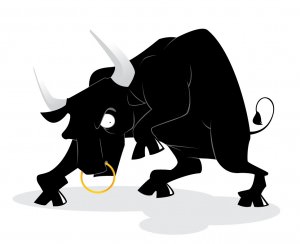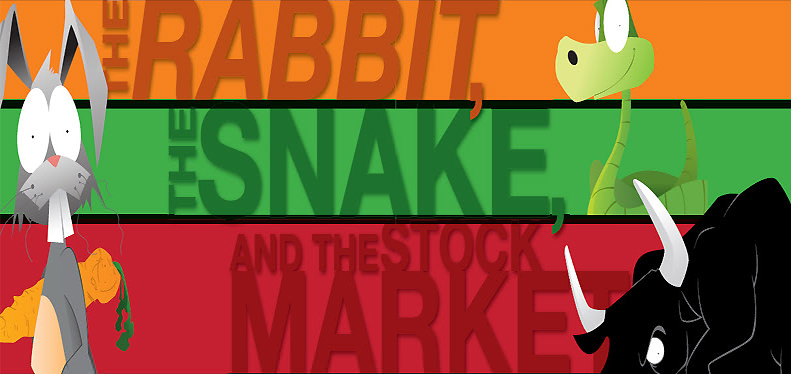Can Boomers Cause Capital Markets to Crash?
“If baby boomers retire and sell off their assets, this will drive down stock prices, causing a fall in the markets worldwide.”
The Snake, The Rabbit and the Stock Market
By Victoria Chau, Staff Writer
Design by Ryan Trinidad, Art Director
What is the market meltdown hypothesis? Simply put, it’s the fear that upon retiring, the millions of baby boomers worldwide will sell off their risky assets (stocks) for safer assets, driving the prices of equities down until the market crashes. Concern for this is rising, as over the previous year the large baby boomer cohort that is scattered throughout the developed world began to retire. Should we be afraid?
To understand the reason for the fear, or to rationalize it away, we must look at the foundations behind this hypothesis and why it may or may not hold true. Let’s begin with the birth of all the baby boomers, as that’s where we can start to develop a sound background as to the impact of baby boomers on the past and our looming future.
The Snake and the Rabbit
Between 1946 and 1964, the world saw the birth of the boomers, a generation characterized by unusually high number of births. This generation is also known as the rabbit that was swallowed by the snake, as the bulge that is created by the rabbit in the snake’s body is likened to the peaks that the baby boomers created in the demographic curve.
Some argue that correlations can be drawn between the financial markets and the stages in life that the baby boomers go through. Let’s begin in the mid-1940s when the baby boomers were born. During this time up until the mid-1960s, the financial markets were boosted by the parents of baby boomers investing for their children’s education. Come 1965 to 1980, baby boomers married and prepared for their own families by investing in housing rather than financial assets, causing housing prices to rise and stock prices to drop.
[pullquote]It is possible that the once desirable Freedom 55 will have to become Freedom 75, 85 or even possibly 95 for those who just cannot afford to retire?[/pullquote]
In the 1980s, when the baby boomers entered their late 30s and early 40s, investment for their own retirement and their children’s education became a priority. Some believe that this investment is the cause of the rise in stock prices during the 80s and 90s in the developed countries and the lowering of housing prices.
So the big question is what happens to the stock market when the baby boomers begin to retire in 2010? The major fear is that the market meltdown hypothesis will come true. The market meltdown hypothesis predicts a fall in stock prices as retired baby boomers withdraw their money from risky financial assets to transfer to safer financial instruments such as bonds.
If baby boomers retire and sell off their assets, this will drive down stock prices causing a fall in the markets worldwide. The basis of this argument is that the baby boomer generation represents a large cohort with their retirement savings tied up in the financial markets. When they try to sell all their assets to prepare for retirement, they will be selling to a younger and much smaller cohort who will simply not have the demand to meet the supply. Economics 101 tells us that when supply is greater than demand, prices must fall.
And thus, a market meltdown ensues.
Getting the Rabbit Down
As baby boomers go through their personal life cycles, they also embark on an investment life cycle. This is akin to the rabbit slowly moving through the snake’s body until it is fully digested. An investment life cycle characterizes the type of behaviour a person engages in depending on where they are in the cycle.
 As any Introduction to Finance course will tell you, a typical person begins investing in their 20s and 30s. At this age, the investment is not in the financial market but the housing market. It is a time when people are typically getting married and building families, requiring most of their income to go towards a place to live.
As any Introduction to Finance course will tell you, a typical person begins investing in their 20s and 30s. At this age, the investment is not in the financial market but the housing market. It is a time when people are typically getting married and building families, requiring most of their income to go towards a place to live.
Once an investor ages and begins to realize that there are a limited amount of paydays remaining, investing for retirement becomes much more important. This is, of course, among other investments such as savings for a child’s education. The closer an investor comes to retirement, the higher their level of risk aversion becomes.
The objective of this investment life cycle is to create a smooth road on which to have a consistent standard of living even when retirement occurs. Thus, it would make sense that as a person gets older they want to ensure the safety of their standard of living and will consequently switch to invest in assets that are less risky.
[pullquote]If baby boomers retire and sell off their assets, this will drive down stock prices, causing a fall in the markets worldwide.[/pullquote]
The disparity between the high demand and low supply of the safe asset—we’ll use bonds as an example here—pushes the price of a bond higher, leaving the overall return on the bond lower than previous years. This process causes the savings of retiring baby boomers to settle at a lower level than their parents’ savings, which will cause a whole other set of problems that deal with retirees in need of financial assistance.
Robin Brooks’ report conducted in the year 2000 on “What Will Happen to Financial Markets When the Baby Boomers Retire?” finds that the age distribution of a population has a very real impact on asset returns. Brooks’ study discovers that this correlation between age distribution and asset returns is inherent in the investment life cycle. As a large portion of the population ages, their demand for safer assets consequently decreases demand for equities, subsequently driving the overall stock market down with stock prices.
How Much Damage Can A Rabbit Really Do?
The whole idea behind the market meltdown hypothesis is that a large portion of the population born at the same time can affect the stock market due to their lifecycle choices. By examining what has happened in the past, we can hope to apply our findings to the future.
The 1980s and 1990s saw an increase in stock prices and the stock market in general did quite well. In 1997, a study conducted by Robin Brooks concluded that a “large working-age cohort raises stock and bond prices.”
More recently, in 2000 and 2001, Andrew Abel examined the effect of a baby boom generation on the price of financial assets. The results were that a generation with an irregularly high number of births would “indeed lead to a run-up in asset prices and that there will be a corresponding reduction in prices when an especially large cohort retires.”
Many scholars agree that the baby boomer generation does seem to have an impact on the financial markets. However, whether or not this impact will lead to a sudden meltdown in the stock markets with the retiring of the baby boomers is another matter entirely.
Abel actually concludes that the impact on the stock market and the asset prices does not necessarily indicate an asset meltdown. Abel’s model points towards a decline in stock prices—as believers in the meltdown hypothesis fear—but concludes that the magnitude of the decline would be much too minimal to be termed a ‘meltdown.’
William Shambora’s 2006 study on the effects of a quickly aging population agrees that some of the momentum of the S&P 500 during the last two decades can be attributed to the increased participation of baby boomers saving for retirement. Shambora believes that it is possible that the opposite will happen when the baby boomer cohort begins to retire, causing downward pressure on the stock market by driving stock prices down.
At the very least, “if a large number of boomers leave the workforce …the growth rate of the stock market will be slowed.”
Digesting the Rabbit
Many academics believe that the effects of the baby boomer generation on the stock market in particular have never been conclusively determined.
 James Poterba’s 2001 examination of “Demographic Structure and Asset Returns” challenges the market meltdown hypothesis by bringing in bequest motives. Poterba believes that it doesn’t take into consideration the future generations that baby boomers will want to leave a legacy for. He argues that although investors accumulate assets quickly when they are working, once retired, they will “de-cumulate” (sell their assets off) much more slowly.
James Poterba’s 2001 examination of “Demographic Structure and Asset Returns” challenges the market meltdown hypothesis by bringing in bequest motives. Poterba believes that it doesn’t take into consideration the future generations that baby boomers will want to leave a legacy for. He argues that although investors accumulate assets quickly when they are working, once retired, they will “de-cumulate” (sell their assets off) much more slowly.
This contradicts the meltdown hypothesis, as its foundation is the assumption that baby boomers will sell off all their assets quickly once they hit retirement age. Nevertheless, he does concur that the baby boomers played a role in the rising stock prices during the 1980s and 1990s.
Economics Professor Fred Lazar at the Schulich School of Business is sceptical of the market meltdown hypothesis. He believes that for it to have merit there needs to be concrete evidence that the baby boomers have already affected our stock market in the past. Looking at the 1980s and 1990s, which other academics have also examined, Professor Lazar explains that there is no real connection between the prosperity of the stock market of this time and baby boomers investing to save for their retirement.
[pullquote]The whole idea behind the market meltdown hypothesis is that a large portion of the population born at the same time can affect the stock market due to their lifecycle choices.[/pullquote]
The main focus behind Professor Lazar’s disbelief in the market meltdown hypothesis is the personal savings rates of baby boomers during this time. The personal savings rate is the portion of disposable income—income after taxes—that is put towards savings. Throughout the 1980s and 1990s, developed countries worldwide saw declining savings rates. Data regarding the personal savings rates during these periods from the Organization for Economic Cooperation and Development (OECD) support Professor Lazar’s observation.
It is this declining personal savings rate that leads Professor Lazar to conclude that the baby boomers weren’t significantly responsible for raising equity prices. A “personal savings rate that…throughout this period tended not to increase, and over the past 15 years tended to decline” would not have been responsible for an upward pressure in the equity markets during the 1980s and 1990s period, since this was the source of their investments.
Their frugality may have been affected by poor saving strategies or the mentality that because “employers are taking care of me I don’t have to save,” but the connection between that and rising equity prices, according to him, is simply not there.
Canada and the Rabbit
It is important to realize that, although Canada has a large baby boomer generation, their retirement will affect different areas in varying ways. We can expect that if baby boomers are retiring and are looking to sell off assets—not necessarily all, and not necessarily all at one time—there will be some repercussions in certain markets.
Retirees looking to downsize by selling their current houses will be affected differently based on location. Those selling houses in urban locations such as the major Canadian cities of Toronto, Vancouver, Montreal and Calgary will be able to reap the benefits of stable or increasing housing prices, since large immigrant populations coming to these cities continue to place upward pressure on housing prices in general. Anything outside of these areas may see a decline in housing prices to some degree as the demand won’t be enough to meet the potential supply.
This type of location impediment does not apply to the stock market. Retiring baby boomers looking to sell off some stocks will be able to sell to anyone in Canada and the rest of the world, no matter the location. They wouldn’t be encumbered by a specific demand group, and although the developing world may not be able to step up to cover the decreasing demand 100%, they should be able to negate the possibility of a full-blown market meltdown.
The Rabbit and Capital Mobility
 An additional worry that arises from the market meltdown hypothesis is that baby boomers are looking to sell off all their capital, which will drain the capital markets and in turn affect a company’s ability to raise capital for new opportunities such as research, development and expansion. What academics are predicting will happen is a shift in where equity is raised.
An additional worry that arises from the market meltdown hypothesis is that baby boomers are looking to sell off all their capital, which will drain the capital markets and in turn affect a company’s ability to raise capital for new opportunities such as research, development and expansion. What academics are predicting will happen is a shift in where equity is raised.
Typically, capital is raised in the developed nations—North America, Western Europe, Australia, etc.—and used to fund any R&D or expansion endeavours. What we can expect to occur in the next decade, if capital markets in the developed world are affected by baby boomers retirement dragging down equity markets, is for companies to go elsewhere in the world.
Professor Lazar is quick to point out that we’re living in a world where there really are no real boundaries for cash flow. If a Canadian company can’t find the funds it needs to increase profits in Canada because of a depressed equity market, the lower prices will be enticing for investors in the developing nation, primarily Asia and South America.
Whether or not this shift is so fundamental that companies will begin to relocate their head offices and operations to these countries remains to be seen, but the fact remains: “there’s mobility in getting capital.” As such, a depressed equities market does not necessarily indicate a downturn in economic growth.
The Rabbit and Our Future
So even if the meltdown hypothesis doesn’t come to fruition, what do we need to know about the baby boomer generation and its effects on the rest of the population? The most popular topic is usually the labour market. People who are going to school and have graduated or will be graduating soon are worried about the job opportunities available for them.
Of course, we’ve already had problems in the last couple of years due to the whole sub-prime debacle, but it is possible that we are in for more trouble down the road. This is another issue that Professor Lazar expresses concern over. He is worried that with the level of saving decreasing during the last few decades—as indicated with the personal savings rate—potential retirees simply will not have saved enough.
Professor Lazar believes that to encourage savings during this time the Canadian government had to practically bribe baby boomers—and their employers—to save by providing tax incentives. On top of that, there is likely a large portion of the population who not only did not save for themselves but also did not work for companies that provided large pension contributions, if any at all.
If this is true, this means that Canada—and likely the rest of the developed world with large baby boomer cohorts—will see a population that is aging while also falling below the poverty line. One way potential retirees will avoid this is by not retiring for a few more years. It is possible that the once desirable Freedom 55 will have to become Freedom 75, 85 or even possibly 95 for those who just cannot afford to retire?
With a large population that is older and also still working, younger Canadians looking for positions after finishing school will be hard-pressed to find the supposedly ample opportunities that would open up as baby boomers retired. After all, there is no longer a mandatory retirement age. Professor Lazar stresses that “in terms of workforce, the retirement age is becoming less and less of a factor.”
For those about to begin job hunting during the next few years, we can only begin to hope that the baby boomers actually did save enough for them to retire so that jobs will open up for the next cohort of new employees. This does, however, assuage some of the fears that with a smaller workforce the economy will become stagnant.
Goodbye Rabbit
So should we feel threatened by the looming retirement of this large baby boomer cohort? Even with the disagreements of academics over whether or not the baby boomers pushed up equity prices in the 1980s and 1990s, there is consistency in the belief that we shouldn’t be overly concerned. The general consensus appears to be that any depression in equity prices will be too minimal to be considered a market meltdown, and furthermore would be staunched by a shift in capital lending from the developed to the developing world to increase the demand for financial assets being sold.
For the governments out there seeking policy changes needed to deal with the retirement of baby boomers, the main focus at this point will probably be on healthcare and social security. Of course, this also means that a shift in the country’s allocation of resources will occur to accommodate such an increasingly older population—but to what degree remains to be seen.
ARB Team
Arbitrage Magazine
Business News with BITE.
Liked this post? Why not buy the ARB team a beer? Just click an ad or donate below (thank you!)
































Share the post "Can Boomers Cause Capital Markets to Crash?"